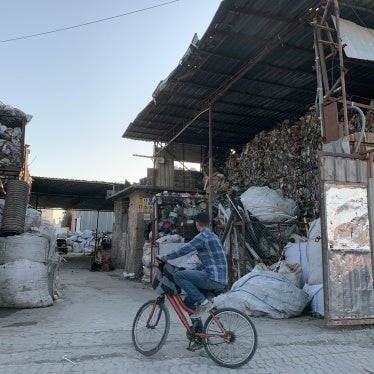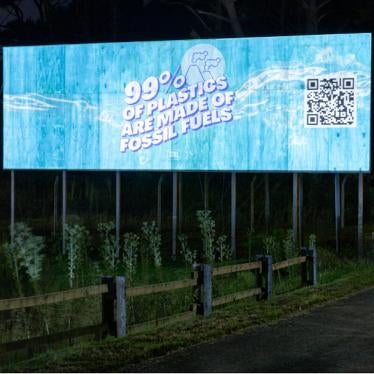(Paris) – Governments negotiating a Global Plastics Treaty should ensure that it addresses the role of fossil fuels in plastic production and includes human rights protections, Human Rights Watch said today.
Countries, businesses, and civil society organizations will meet in Paris beginning on May 29, 2023, for a second round of talks on an international legally binding treaty on plastic pollution and are expected to mandate a “zero draft” treaty for consideration at the third round of negotiations.
“Improving waste removal and recycling will not end the human rights harm of plastic pollution,” said Katharina Rall, senior environment researcher at Human Rights Watch. “Governments need to make sure that the new treaty addresses the ultimate source of plastic pollution, which is the production of fossil fuels.”
The production, use, and disposal of plastics contribute to the climate crisis and can cause significant harm to the human rights of people around the world, Human Rights Watch said in a question-and-answer document about the human rights impacts of plastics.
The plastic life cycle begins with oil and gas extraction as 99 percent of plastics are made from fossil fuels, which are the primary driver of the climate crisis. Current trajectories predict that plastics and petrochemicals will drive 30 percent of the growth in oil demand by 2030 and nearly half of the growth by 2050.
In an “options for elements” paper published in April, the United Nations Environment Programme laid out potential components of the new treaty based on submissions from governments. The document says that fossil fuels are responsible for greenhouse gas emissions and suggests the reduction of plastic production as an option, but it fails to suggest the phaseout of fossil fuels and related subsidies as an element of the future treaty.
In their submissions to the Environment Programme, nearly half of the countries endorsed a full life cycle approach to tackle the plastic crisis and a quarter of the countries agreed to reduce plastic production. New Zealand, Rwanda, and Norway – the latter two as co-chairs of the High Ambition Coalition, a group of countries dedicated to progressive approaches to the plastic treaty, called for reducing plastic production linked to fossil fuels as well as reducing or eliminating fossil fuel subsidies.
Human Rights Watch has documented the harm posed by plastic recycling to the right to health of workers and residents living near plastic recycling facilities. Other research has shown that shipment of plastic waste from countries in the Global North to countries with weak or nonexistent environmental regulations, low labor costs, and little government oversight of environmental and labor rights violations can contribute to serious human rights harm.
The UN paper also suggests the option of prohibiting plastic incineration, waste-to-energy processes, and chemical recycling, labeling these waste management methods as dangerous practices. The paper includes development of a streamlined permit process for plastic waste shipment to countries with limited capacity in their recycling facilities, but it falls short of proposing a ban on the shipment of plastic waste.
Earlier in 2023, the European Parliament adopted proposals on new rules to ban plastic waste exports outside of the European Union, an important step toward protecting communities around the world. The Council of the EU is still negotiating its own proposals on the proposed new rules. EU member states including France as a host of the treaty negotiations should support an export ban at the EU level and as part of the new treaty, Human Rights Watch said.
“The race to tackle the plastic crisis and prevent a climate catastrophe requires every country to tackle these problems at their common source by urgently phasing out fossil fuels,” Rall said. “Governments need to work toward a binding legal instrument that addresses the role of fossil fuels in plastic production and includes human rights protections for workers and others whose health is harmed by plastics.”







